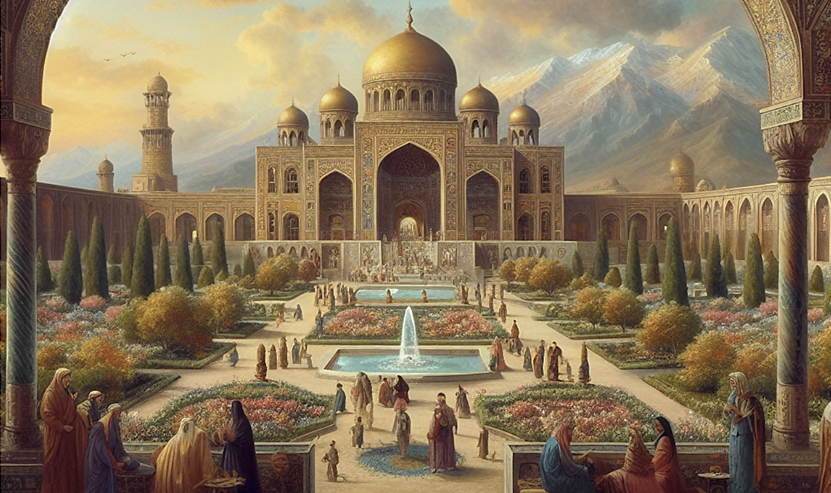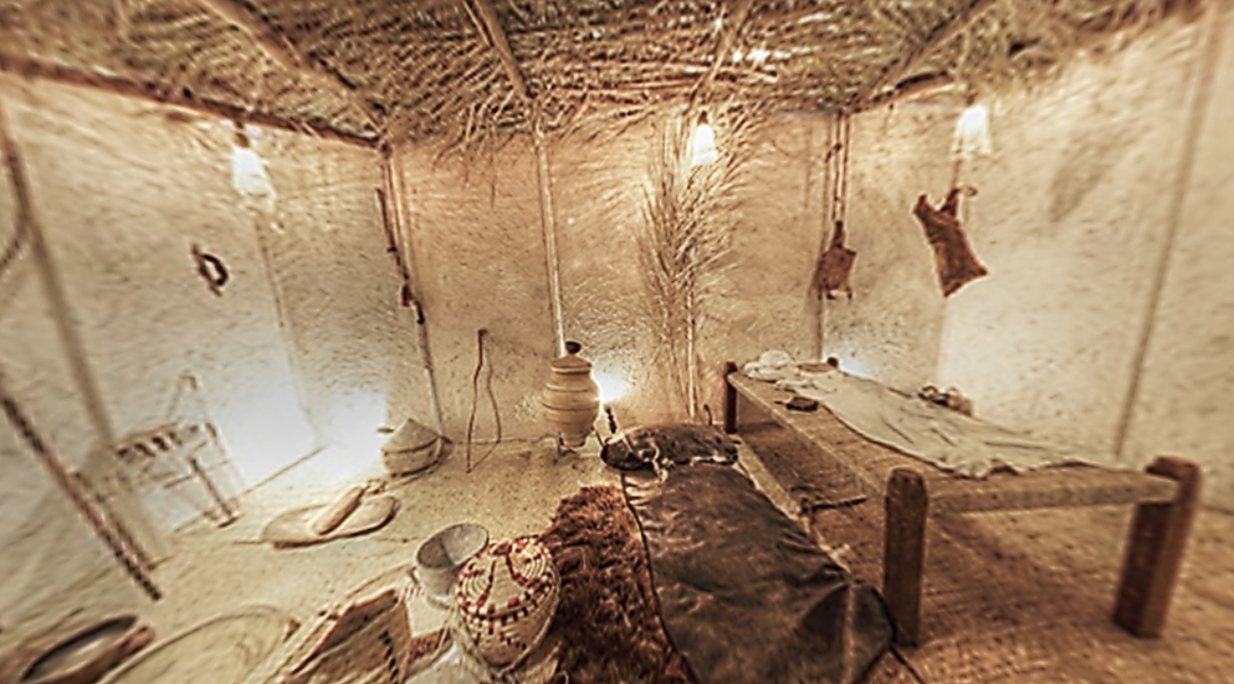Contents
Who was he?
Prophet Muhammad (PBUH) was born in Mecca, which at the time was a very backward society, steeped in idolatry and ignorance (only a handful of people in the city were literate). The two superpowers and super-civilisations at that time, the Byzantine and Persian Empires, bordered Arabia but neither had reckoned Arabia, impoverished, sparsely populated and plagued with anarchy and tribal wars, worth conquering. Being neutral, Mecca survived as a trading centre. Muhammad himself was a merchant, not exceptional – apart from being well known for his good character and sound judgement.
At 40 things changed: sick of the hustle and bustle of the market town, he would retreat for days into the surrounding caves to meditate. It was there that he was visited by Angel Gabriel who began reading verses of the Qur’an to him, verses which continued to be revealed in clumps for the rest of his life. From then on, his trade took a back seat as he launched a vibrant, dynamic movement to eradicate idolatry, immorality, and injustice and to revive in Arabia, once more, belief in the One, True God. The first to believe in him were his family and close friends. Later, many middle-class youth were attracted to his call, as were a few poor people. Gradually, despite severe persecution, the numbers grew.
After 13 years of preaching, the people of Medina discovered Islam; they readily accepted him as their leader and he finally established a state there based on his teachings. From there, Islam spread out rapidly, so that ten years on, when he passed away, the whole of Arabia had been won over to his cause. Within a further 20 years, Islam had spread over much of the known world, crushing Persia and shaking Byzantium. All these people had accepted Islam of their own free will: Islam forbids compulsion in belief.

Frame from 3D animated walk-through of Medina at the time of the Prophet (with outer wall of the Prophet’s mosque to the right)
What did he claim?
Muhammad claimed emphatically that he was a Prophet chosen by God, like those before him (citing Noah, Abraham, Moses, Jesus, etc.) to convey His guidance to not only the Arabs, but all mankind – to lead them to success, as individuals, societies and nations. As all previous teachings of this kind were distorted beyond repair, it was necessary for him to be sent to renew The Guidance.
Let's Be Frank
Islam emphasises that, for a person to firmly believe in something, he must be rationally, logically convinced – otherwise he has no right to be ‘certain’ of his belief (i.e, no “blind faith” in Islam). We are therefore not shy about discussing the alternatives to his claim:
Unconscious Fabrication?
Some people have suggested that he was genuine, but mentally ill. However, most mental illnesses reduce one’s concentration. Furthermore, if he was mad, it would have been obvious to people, and those that knew him best would not have been the first to accept him. And how then could so many have loved him and devoted themselves to him? Another claim is that he was possessed by demon (?!). But if we accept a supernatural origin, is it not more sensible to assume the more likely source: God – for which ‘evil spirit’ would create a religion where people are devoted to God, do good and uphold justice?

Self-interest?
More likely motives: could he have done it to get rich? Let us look at his lifestyle while he was ruler of all Arabia…
A companion once looked into his room to find only 3 pieces of leather and a handful of barley lying in the corner. He began to weep explaining,
“O Prophet of Allah (God) why should I not weep? I can see the mat’s pattern imprinted on your body and I also see what little you have in this room. O Messenger of God! Pray that Allah may grant ample provisions for us. The Persians and the Romans (Byzantines) who have no true faith and who worship not God, only their kings – the Kaisers and the Caesars – should live in gardens with streams running below but the Chosen Prophet and servant of God should live in such dire poverty?”
On hearing this the Prophet sat up, saying,
“O Omar! Are you still in doubt about this matter (i.e. Islam)? Ease and comfort in the Hereafter are much better than ease and comfort in this world.”
(Authenticated hadith, Sahih Muslim 1479)
Being care-laden with the anxiety of after-life, the Prophet would remain engrossed in the thought of hereafter continually for long spells and seemed to be endlessly perturbed by it. Often he would remain silent for long and never spoke needlessly. when he spoke, he enunciated each syllable distinctly and thus he would also end his speech. Whatever he said, it was always explicit and in plain terms. His speech was never long- winded nor unnecessarily concise. He was kind-hearted, soft spoken, never harsh or cool in his behaviour. Neither he humiliated anyone nor himself liked to be treated with disrespect. The prophet set much by every provision; even if it was small in quantity, he never deprecated it.
(Description by a contemporary – Hind bin Abi Hala )
Some argue he designed the religion to acquire power. But in Mecca, the tribal leaders, fed up of his threatening movement, tried to bribe him with power, if he would stop preaching. They knew he possessed qualities which would make a good leader. But why did he refuse? Instead he chose persecution and hardship – with no apparent end in sight. And when he finally became leader, his conduct did not reflect a power hungry dictator. Medina was troubled by many internal intrigues – a number of people became Muslim hoping it would increase their influence, and then began undermining the Prophet’s authority. They were blatant hypocrites but the Prophet did not speak out against even one of them – a dictator would have executed the lot!
Furthermore, he conducted all affairs (outside revelation) with consultation. He did not allow himself any personal privilege over his people. Once he was taking turns on riding a camel with two companions. They naturally offered him their share, but he refused, saying, “I am still in need of reward (from God).”

The dreams and aspirations of worldly kings
Betterment of Humanity?
Is it possible that, being entirely sincere in wanting to reform humanity and better it, he devised the whole religion of Islam, with heaven and hell so that people, deceived into fearing an imaginary Hereafter and ever-watchful God would become morally upright (as they did prove to become)?
Did Noah, Abraham, Moses, Daniel, Job, Joshua, Jacob, John, Jesus, etc. all hatch out the same plan and did Muhammad, entirely by coincidence, devise the same God, Hereafter, basic rules and moral tenets they had preached? Not likely.
Furthermore, there are so many things which he did not need to then do, e.g, pray alone, every night, for hours on end. And did he really then need to go to such extremes of self-denial? Why did he need to make up the fantastic story about him travelling up through the heavens and meeting God in just one night – something which only intensified ridicule of him in Mecca? How could he have motivated himself in the early days (in Mecca) to endure such persecution of his beloved family (which claimed his wife’s life) and friends when at that time, Islam, in all reasonableness, seemed to offer only annihilation for the believers? Most importantly, how is it ever possible for an otherwise completely honest person, to go through 23 years of his life incessantly preaching and practising a naked lie?
Sincerity
On the very day that his beloved son passed away a solar eclipse happened to occur. If the Prophet (PBUH) had wanted to seize any opportunity to promote his claim, he could have forwarded this as a sign of divine grief. Instead, he insisted that these are just natural phenomena.
Narrated his companion (Al-Mughira bin Shu’ba):
–
“The sun eclipsed in the lifetime of Allah’s Apostle on the day when (his son) Ibrahim died. So the people said that the sun had eclipsed because of the death of Ibrahim. Allah’s Apostle said, “The sun and the moon do not eclipse because of the death or life (i.e. birth) of some-one. When you see the eclipse pray and invoke Allah.”
(Authenticated hadith, Sahih Bukhari)
The sincerity of the Prophet was demonstrated time and again. He would pray the night long when there were none to witness this but his household. Aisha, the Prophet’s wife reported:
Narrated his companion (Al-Mughira bin Shu’ba):
–
When the Prophet (peace and blessings be upon him) prayed (the optional night prayers: Qiyam-ul-layl), he would stand until (the skin of) his feet swelled. So, I said, “O Prophet of God, do you do as such while God has forgiven you all sins?”
–
He responded: “Should not I be a grateful servant of God?”
(Authenticated hadith, Sahih Muslim)
The Prophet (peace and blessings be upon him) would want the hereafter most ardently for his own family at the deprivation of their worldly comfort. Once his daughter Fatima asked for a servant to help her. Instead, he advised her on the best utterances to remember God. Another time, Ali (his beloved son in law and cousin) reported that the Prophet visited him and [his wife] Fatima one night and said, “Why do you not observe prayer (at night)?” (Al-Bukhari and Muslim).

3D reconstruction of Prophet Muhammad’s private chamber, where he passed away.
One companion [of the Prophet] was once offered a meal of roast goat. He refused, saying, ‘The Holy Prophet passed away from this world without having eaten his fill, even of barley bread.’
–
The companion Abdullah ibn Mas’ud reported: The Messenger of God, peace and blessings be upon him, laid down upon a reed mat and it left marks on his side. When he woke up, I started wiping his side, and I said, “O Messenger of God, why do you not let us spread something on top of this mat for you?” The Prophet said, “What is the world to me? What am I to the world? Verily, the parable of myself and this world is that of a rider who seeks shade under a tree, then he moves on and leaves it behind.”
(Musnad Ahmad 3709, graded sahih/ authentic)
Question of Ability
The thing most perplexing about the Prophet is, how was it possible for a man like Muhammad to come up with a book like the Qur’an? Christians and Jews have long claimed he forged the Qur’an based on the Bible. But Muhammad did not spend years studying in Byzantium or Persia – and even then, being illiterate, he could not read the Bible. Also, Islam does not share unscientific and illogical aspects of Biblical tradition and it brings new laws which can only be appreciated by modern society. Islam preached injunctions and rituals which had been extinct from Jewish practise for centuries.
Furthermore, what astounded the Arabs at the time was the quality of the Qur’an – perfect prose in a language that has never since been matched (yet before the revelation of the Qur’an, and in his ordinary conversations after it, the Prophet never acquired any distinction as a poet). And what amazes so many today is that the Qur’an, while making reference to so many scientific phenomena does not display the slightest contradiction with modern science.
In addition, many of the details mentioned there could not possibly have been known then – some are being discovered only now, e.g, big bang theory, water cycle, expansion of the universe, all stars and planets having an orbit, the early stages of embryological development, e.g. that bones are formed first and then they are clothed in muscle, etc.
When could he have found a chance to think about the Qur’an? For he was always engrossed in the affairs of state, or his family life or religious teaching. And at all times he was under the adoring eyes of his companions. These companions themselves frequently witnessed revelation – he would go into a sort of trance and fit.
We’ll leave you to consider the possibilities…
What have others who studied his life thought about him?
–
“Philosopher, orator, apostle, legislator, warrior, conqueror of ideas, restorer of rational dogmas, of a cult without images; the founder of twenty terrestrial empires and of one spiritual empire, that is Muhammad. As regards all standards by which human greatness may be measured, we may well ask, is there any man greater than he?”
Lamartine, Histoire de la Turquie, Paris 1854 Vol. II, pp. 276-77.
“He was Caesar and Pope in one; but he was Pope without Pope’s pretensions, Caesar without the legions of Caesar: without a standing army, without a bodyguard, without a palace, without a fixed revenue; if ever any man had the right to say that he ruled by the right divine, it was Mohammad, for he had all the power without its instruments and without its supports.”
Bosworth Smith, Mohammad and Mohammadanism. London 1874, p. 92.
“It is impossible for anyone who studies the life and character of the great Prophet of Arabia, who knows how he taught and how he lived, to feel anything but reverence for that mighty Prophet, one of the great messengers of the Supreme. And although in what I put to you I shall say many things which may be familiar to many, yet I myself feel whenever I re-read them, a new way of admiration, a new sense of reverence for that mighty Arabian teacher.”
Annie Besant, The Life and Teachings of Muhammad, Madras 1932, p.4.
“He was simply a nadhir, a messenger with a warning, and should approach the Quraysh humbly, avoid provocation, and be careful not to attack their gods. This is what the great prophets had done in the past. A prophet had to be altruistic; he must not trumpet his own opinions egotistically or trample on the sensibilities of others, but should always put the welfare of the community first.”
Karen Armstrong, Muhammad: Prophet for Our Time.
“At Muhammad’s own death an attempt was made to deify him, but the man who was to become his administrative successor killed the hysteria with one of the noblest speeches in religious history: ‘If there are any among you who worshipped Muhammad, he is dead. But if it is God you worshipped, He lives forever’.”
James A. Michener, ‘Islam The Misunderstood Religion’, In the Reader’s Digest (American Edition) for May 1955, pp. 68-70.
“I wanted to know the best of the life of one who holds today undisputed sway over the hearts of millions… I became more than ever convinced it was the rigid simplicity, the utter self-effacement of the Prophet, the scrupulous regard for pledges, his intense devotion to his friends and followers, his intrepidity, his selflessness, his absolute trust in God and his own mission. These surmounted every obstacle.
–
Muhammad was a great Prophet. He was brave and feared no one but God. He was never found to say one thing and do another. He acted as he felt. The Prophet was a faqir. He could have commanded wealth if he had so desired. I shed tears when I read of the privations, he, his family and companions suffered voluntarily. How can a truth-seeker like me help but respect one whose mind was constantly fixed on God, who ever walked in God’s fear and who had boundless compassion for humanity.”
Mahatma Gandhi, My Jail Experiences, p-133, vol-29.
